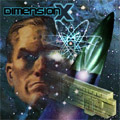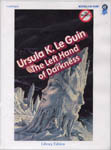

 Red Planet
Red Planet
By Robert A. Heinlein; Read by a full cast
6 CDs – 7 Hours [UNABRIDGED]
Publisher: Full Cast Audio
Published: 2009
ISBN: 9781934180518
Themes: / Science Fiction / Mars / Politics / Gender /
Sample |MP3|
Jim Marlowe’s Martian pet, Willis, seems like nothing more than an adorable ball of fur with an astonishing ability to mimic the human voice. But when Jim takes the creature to academy and runs afoul of a militantly rigid headmaster, his devotion to his pet launches the young man on a death-defying trek across Mars. Accompanied by his buddy, Frank, Jim must battle the dangers of a hostile planet. But it is not only the boys’ lives that are at stake: They have discovered explosive information about a threat to the survival of the entire colony—information that may mean life or death for their families.
Listening to Heinlein’s stories brought to life is a wonderful experience. One of the things I enjoy most about Heinlein’s quirky novels is that the politics are never fully aligned with any conventional ideology. There are repeated themes, to be sure, but they play out fairly differently in each story. I had read Red Planet at least once before and upon listening to this terrific audiobook version I was actually quite surprised by the relevance to modern politics and social phenomena. First published in 1949, and set on a Mars that is surprisingly believable, it has some very modern protagonists teenagers. Jim Marlowe and Frank Sutton get into some rather exciting adventures. They spend chilly days outside on Mars suited up in mechanical counter-pressure suits, with supercharging helmets that provide a suitable pressurized oxygen from the wispy (but oxygenated) atmosphere of Heinlein’s Mars. These suits, are much lighter than conventional air pressure suits and allow the extreme mobility needed for their skating down the frozen canals of Mars. When not outside fighting off water seekers Jim, Frank, and almost every other colonist on Mars dresses like they live on a tropical beach (they live, go to school, and work in pressurized domes). Virtually no one goes outdoors during the Martian nights (or winters) as they are cold enough to freeze even a stolid martian kid solid. Indeed, part of the excitement of the novel comes when Jim, and Frank find themselves trapped in the Martian desert far from any habitable shelter just as sunset is approaching. Heinlein’s solution is both ingenious and original.
Unlike some previous Heinlein novels produced by Full Cast Audio, Red Planet is not told in first person by the main character. Instead the voice talent of William Dufris is employed to narrate. I’m a big fan of Dufris’ narrative abilities, and he does a terrific job with Red Planet. Jacob Coppola as Jim Marlowe, and Christopher Reiling as Frank Frank Sutton are both vigorous and youthful but also distinct enough to tell apart. The rest of the cast supports the story with an assortment of villainous, larcenous good humor, and stubborn contrariness – in other words nearly the full Heinleinian character spectrum. One other note, the voice of Willis is often performed by whichever actor Willis is imitating and this works just fine! Finally, check out the gorgeous cover art by Jerry Russell, it’s absolutely fantastic!
Posted by Jesse Willis







 The Left Hand Of Darkness
The Left Hand Of Darkness